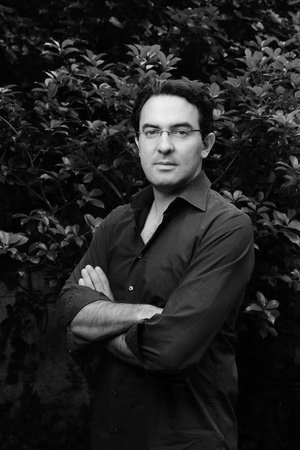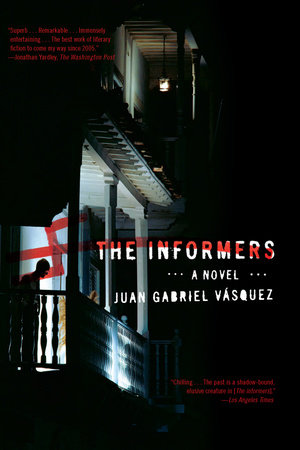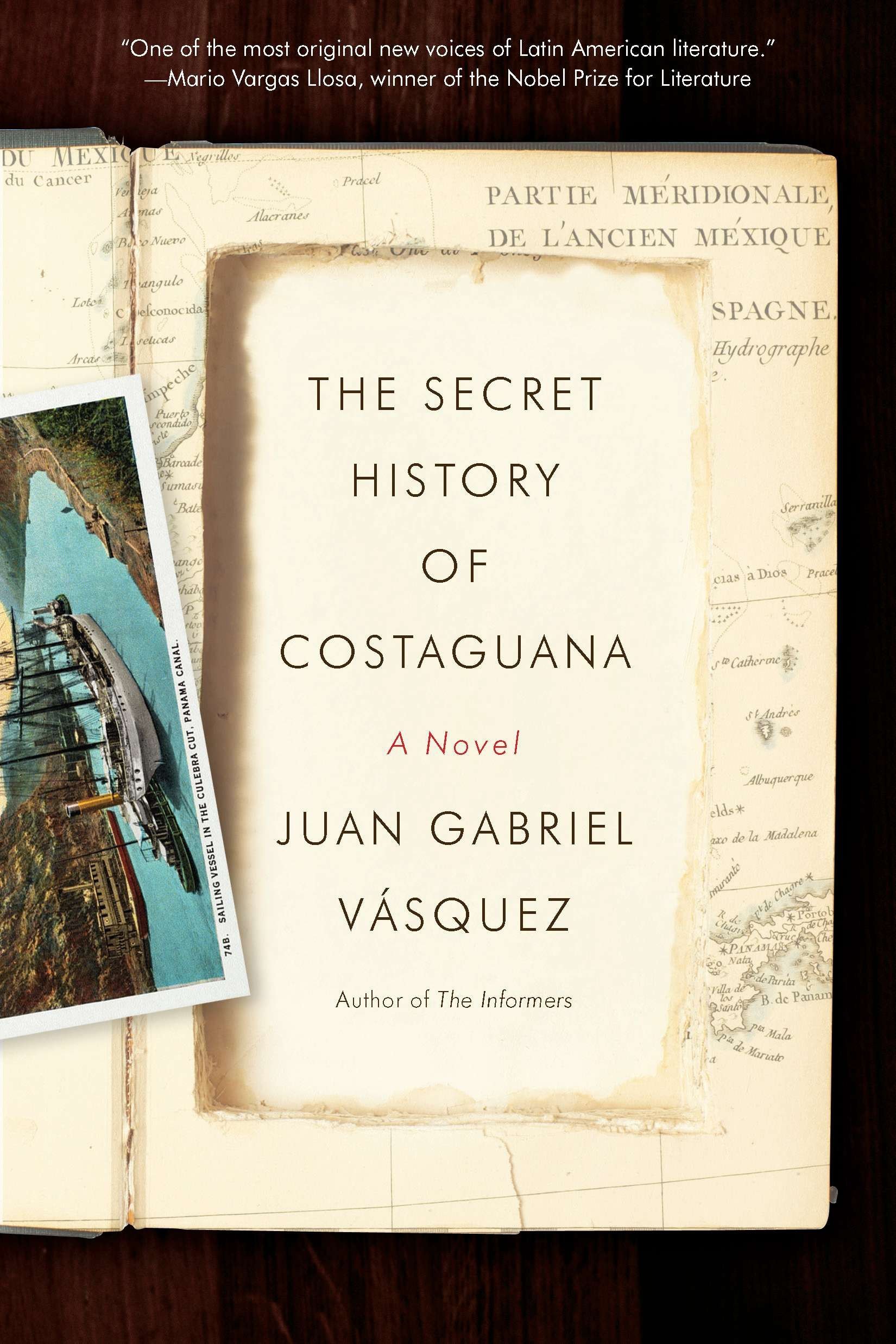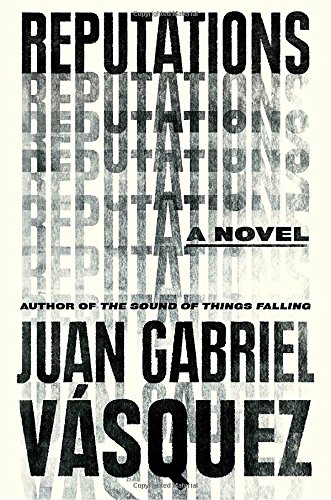

Juan Gabriel Vásquez
New York Times Bestselling Novelist
Colombian Writer, Journalist, Political Commentator
International IMPAC Dublin Award-winner
Man Booker Prize Finalist


Readings &
Lecture Topics
- An Evening with Juan Gabriel Vásquez
Biography
“A reinventor of Latin American literature in the 21st century.” ―Jonathan Franzen
“Juan Gabriel Vásquez, it could be argued, has succeeded García Márquez as the literary grandmaster of Colombia, a country that can boast of many eminent authors.” ―New York Review of Books
Regarded as one of the most important Latin American novelists working today, Juan Gabriel Vásquez is a Colombian writer, journalist, political commentator, and translator. Born in Bogotá, Colombia, in 1973, he is the author of seven novels, two short story collections, and two books of literary essays, as well as hundreds of pages of political commentary.
Vásquez has six books available in English, all translated by Anne McLean and published in the United States by Riverhead.
His novel The Shape of the Ruins (2018) was shortlisted for the 2019 International Man Booker Prize and won both Spain’s Alfaguara Prize and Italy’s Von Reezzori Prize; Reputations (2016) was a New York Times Best Book of the Year; The Sound of Things Falling (2013) was a National Bestseller and winner of the 2014 International IMPAC Dublin Literary Award; The Secret History of Costaguana (2011), consolidated Vasquez’s status a one of the most important novelists working today when Nobel Prize winner Mario Vargas Llosa named him “one of the most original new voices in Latin American literature”; and The Informers (2010). He is also the author of a short story collections Songs for the Flames (2021) and Lovers on All Saints’ Day (2015).
His 2018 novel The Shape of the Ruins is a sweeping tale of conspiracy theories, assassinations, and twisted obsessions exploring the darkest moments of a country’s past. Vanity Fair writes: “This is the big, sweeping book of Colombia that Vásquez has been building up to—a novel that obsessively re-examines the fanaticism and deceptions at the heart of Colombia’s past and present.” Time Magazine says further, “it interrogates the way moments of violence in Colombia’s past have retained their power long after they are over.” Reputations is a novel about the power of politics and personal memory, in which Vasquez examines the weight of the past, how a public persona intersects with private histories, and the burdens and surprises of memory. An intimate portrayal of Colombia’s drug wars, The Sound of Things Falling investigates the country’s recent violet past as well as its protagonist’s own personal reckoning. Hailed by Edmund White as “brilliant, gripping, and absorbing right to the end,” he noted that the book “may be a page turner, but it’s also a deep meditation on fate and death.”
The short story collection Lovers on All Saints’ Day is his first work set in Europe, written during his years spent in France and Belgium. Published in Spanish in 2001, the collection was translated into English in 2015. NPR writes: “With few exceptions, the seven stories that compose the collection deal with hunters, journalists, disgruntled heirs to stately property—but, whatever their occupations and interests, Vásquez searches them out in details that might otherwise have gotten squandered… At times it takes darkness—literally, in the case of the long night in ‘Life on Grimsey Island’ the collection’s final story—to arrive at searing illumination.”
The author’s honors include the Prix Roger Callois, the Premio Nacional de Periodismo Simón Bolívar 2007, Premio Real Academia Espanola, Premio Casa de América Latina de Lisboa, Prix Carbet des Lycéens, and Prémio Literário Casino da Póvoa. In 2016, he received the Ordre des Arts et des Lettres by the Ministry of Culture in France and, two years later, Cruz Oficial de la Orden de Isabel la Católica by the Ministry of Culture in Spain.
Vásquez’s novels have been published in twenty-five languages worldwide. An acclaimed translator himself, he has translated works by E. M. Forster and Victor Hugo, amongst others, into Spanish. He once told The New York Times in an interview that the toughest thing about translating is being unfaithful to the original: “Doing a little violence to a sentence you love is hard, and many sleepless nights can be caused by it.”
After sixteen years living in France, Belgium, and Spain, he now resides between Bogotá and New York City.
Short Bio
Juan Gabriel Vásquez is the author of numerous novels, including The Shape of the Ruins, which was shortlisted for the 2019 International Booker Prize; Reputations, a New York Times Best Book of the Year; and The Sound of Things Falling, a National Bestseller and winner of the 2014 International IMPAC Dublin Literary Award. Vásquez’s novels have been published in twenty-five languages worldwide. After sixteen years living in France, Belgium, and Spain, he now resides between Bogotá and New York City.
Publications
THE INFORMERS
(Novel, 2010)
“The best work of literary fiction to come my way since 2005…and into the bargain it is immensely entertaining, with twists and turns of plot that yield great satisfaction.” —The Washington Post
When Gabriel Santoro’s book is scathingly reviewed by his own father, a famous Bogotá rhetorician, Gabriel is devastated. Cataloguing the life of longtime family friend Sara Guterman, a Jewish German immigrant who escaped to Colombia during the 1930s, Gabriel’s book seemed an innocent attempt to preserve a piece of his country’s rapidly vanishing past. But as Gabriel pours over his research looking for clues to his father’s anger, he discovers a sinister secret locked in the pages. After his father’s death, and with the help of Sara Guterman and his father’s girlfriend, Angelina, Gabriel peels back layer after shocking layer of family history-from the streets of 1940s Bogotá to a stranger’s doorstep in 1990s Medellín-to reveal a hidden portrait of their past-dark, complex, and inescapable.
THE SECRET HISTORY OF COSTAGUANA
(Novel, 2012)
“Audacious…a potent mixture of history, fiction and literary gamesmanship.”—Los Angeles Times
On the day of Joseph Conrad’s death in 1924, the Colombian-born José Altamirano begins to write and cannot stop. Many years before, he confessed to Conrad his life’s every delicious detail—from his country’s heroic revolutions to his darkest solitary moments. Those intimate recollections became Nostromo, a novel that solidified Conrad’s fame and turned Altamirano’s reality into a work of fiction. Now Conrad is dead, but the slate is by no means clear—Nostromo will live on and Altamirano must write himself back into existence. As the destinies of real empires collide with the murky realities of imagined ones, Vásquez takes us from a flourishing twentieth-century London to the lawless fury of a blooming Panama and back in a labyrinthine quest to reclaim the past—of both a country and a man.
LOVERS ON ALL SAINTS’ DAY
(Short Stories, 2016)
“Vásquez’s prose is rich in detail and sparkles with poetic lushness, as well as echoing the realist canon in the superb control of plot, setting and characters. Without truculence, he delivers a tense and exciting read.”—Miami Herald
Lovers on All Saints’ Day is an emotional book that haunts, moves, and seduces. Juan Gabriel Vásquez, the brilliant novelist, now brings his keen eye and rich prose to the themes of love and memory in these seven powerful stories. Vásquez achieves an extraordinary unity of emotion with these fragmented lives. A Colombian writer is witness to a murder that will mark him forever. A woman sits alone in her house, waiting for her husband to return from an expedition to find wood for their stove, while he lies in another woman’s bed a few miles away, unable to heal the wound in his own marriage. In these stories, there are love affairs, revenge, troubled pasts, and tender moments that reveal a person’s whole history in a few sentences. Set in Europe (the scene of Vásquez’s own self-imposed exile from Latin America) and never before available in English, this collection evokes a singular mood and a tone, and showcase Vásquez’s hypnotic writing. Vásquez is a humane, deeply insightful writer, and these stories leave one feeling transformed from the experience of reading them, with a greater vision of humanity and society, a greater understanding of relationships and of love.
REPUTATIONS
(Novel, 2013)
“Vásquez is a penetrating force, and the most pressing Colombian writer today. Reputations is a powerful, concentrated achievement. It makes clear that our memories, and even the things we’ve forgotten, can come back to haunt us and make us question the true cost of our actions.”—NPR
A brilliant novel about the power of politics and personal memory from one of South America’s literary stars. Javier Mallarino is a living legend. He is his country’s most influential political cartoonist, the consciousness of a nation. A man capable of repealing laws, overturning judges’ decisions, destroying politicians’ careers with his art. His weapons are pen and ink. Those in power fear him and pay him homage. After four decades of a brilliant career, he’s at the height of his powers. But this all changes when he’s paid an unexpected visit from a young woman who upends his sense of personal history and forces him to re-evaluate his life and work, questioning his position in the world. In Reputations, Juan Gabriel Vásquez examines the weight of the past, how a public persona intersects with private histories, and the burdens and surprises of memory. In this intimate novel that recalls authors like Coetzee and Ian McEwan, Vásquez plumbs universal experiences to create a masterful story, one that reverberates long after you turn the final page. Named a Best Book of the Year by the NY Times, Newsweek, the Guardian, and Kirkus.
THE SHAPE OF RUINS
(Novel, 2018)
“This compelling read is more than a standard mystery; it interrogates the way moments of violence in Colombia’s past have retained their power long after they are over.” —Time Magazine
A sweeping tale of conspiracy theories, assassinations, and twisted obsessions–-the much anticipated masterpiece from Juan Gabriel Vásquez. The Shape of the Ruins is a masterly story of conspiracy, political obsession, and literary investigation. When a man is arrested at a museum for attempting to steal the bullet-ridden suit of a murdered Colombian politician, few notice. But soon this thwarted theft takes on greater meaning as it becomes a thread in a widening web of popular fixations with conspiracy theories, assassinations, and historical secrets; and it haunts those who feel that only they know the real truth behind these killings. This novel explores the darkest moments of a country’s past and brings to life the ways in which past violence shapes our present lives. A compulsive read, beautiful and profound, eerily relevant to our times and deeply personal, The Shape of the Ruins is a tour-de-force story by a master at uncovering the incisive wounds of our memories.
Articles & Audio
Read What’s In Print
• A Storm Waiting to Happen: A Colombian Writer Watches His Home From Afar – New York Times
• Ariel Dorfman Reviews The Shape of Ruins —New York Review of Books
• Review of Reputations —New York Times
• Review of Reputations —Washington Street Journal
• Silvana Paternostro interviews Juan Gabriel Vásquez – BOMB
• Juan Gabriel Vásquez: By the Book – New York Times
• A Life in Writing — The Guardian
• Review of The Sound of Things Falling – LA Times
Listen to Audio
• Written In Spanish About Belgium By A Colombian, ‘It Feels American’ – NPR
Selected Writings
• Read More in a Longer Excerpt from The Sound of Things Falling
The Man Who Spoke of Inauspicious Dates
The last time I saw him, Carlos Carballo was climbing with difficulty into a police van, his hands cuffed behind his back and his head hunched down between his shoulders, while a news ticker running along the bottom of the screen reported the reason for his arrest: the attempted theft of the serge suit of an assassinated politician. It was a fleeting image, spotted by chance on one of the late-night newscasts, after the loudmouthed assault of the commercials and shortly before the sports update, and I remember having thought that thousands of television viewers would be sharing that moment with me, but only I could say without lying that I wasn’t surprised. He was arrested in front of the former home of Liberal leader Jorge EliŽcer Gait‡n, now a museum, where armies of visitors arrive every year to come into brief and vicarious contact with the most famous political crime in Colombian history. The serge suit was the one Gait‡n was wearing on April 9, 1948, the day Juan Roa Sierra, a young man with vague Nazi sympathies, who had flirted with Rosicrucian sects and often conversed with the Virgin Mary, awaited him as he left his office and shot him four times at close range in the middle of a busy street in the broad daylight of a Bogot‡ lunchtime. The bullets left holes in the jacket and the waistcoat, and people who know that visit the museum just to see those dark empty circles. Carlos Carballo, it might have been thought, was one of those visitors.
That happened on the second Wednesday of April in the year 2014. It seems Carballo had arrived at the museum around eleven in the morning, and for several hours had been wandering through the house like a worshipper in a trance, or standing with his head tilted in front of the books on criminal law, or watching a documentary with stills of burning tramcars and irate people with raised machetes shown repeatedly over the course of the day. He waited for the last group of uniformed schoolchildren to leave before going up to the second floor, where a glass case protected the suit Gait‡n was wearing on the day of his assassination, and then he began to shatter the thick glass with a knuckle-duster. He managed to put his hand on the shoulder of the midnight-blue jacket, but he didn’t have time for anything else: the second-floor guard, alerted by the crash, was pointing his pistol at him. Carballo noticed then that he’d cut himself on the broken glass of the case, and began to lick his fingers like a stray dog. But he didn’t seem too worried. On television a young girl in a white blouse and tartan skirt summed it up:
“It was as if he’d been caught painting on a wall.”
All the newspapers the next day referred to the frustrated robbery. All of them were surprised, hypocritically shocked, that the myth of Gait‡n still awoke such passions sixty-six years after the events, and some made the comparison for the umpteenth time to the Kennedy assassination, the fiftieth anniversary of which had been marked the previous year without the slightest diminution of its power to fascinate. All of them remembered, in case anyone had forgotten, the unforeseen consequences of the assassination: the city set on fire by the populist protests, the snipers stationed on the rooftops firing indiscriminately, and the country at war in the years that followed. The same information was repeated everywhere, with more or less subtlety and more or less melodrama, sometimes accompanied by images, including those of the furious crowd, which had just lynched the murderer, dragging his half-naked corpse along the cobblestones of Carrera SŽptima, in the direction of the Presidential Palace; but on no media outlet could you find a speculation, as gratuitous as it might be, about the reasons a man who wasn’t mad might have for deciding to break into a glass case in a guarded house and make off with the bullet-ridden clothing of a famous dead man. Nobody posed that question, and our media memory gradually began to forget Carlos Carballo. Swamped by everyday violence, which doesn’t give anyone time to even feel discouraged, Colombians allowed that inoffensive man to fade away like a shadow at twilight. Nobody thought of him again.



